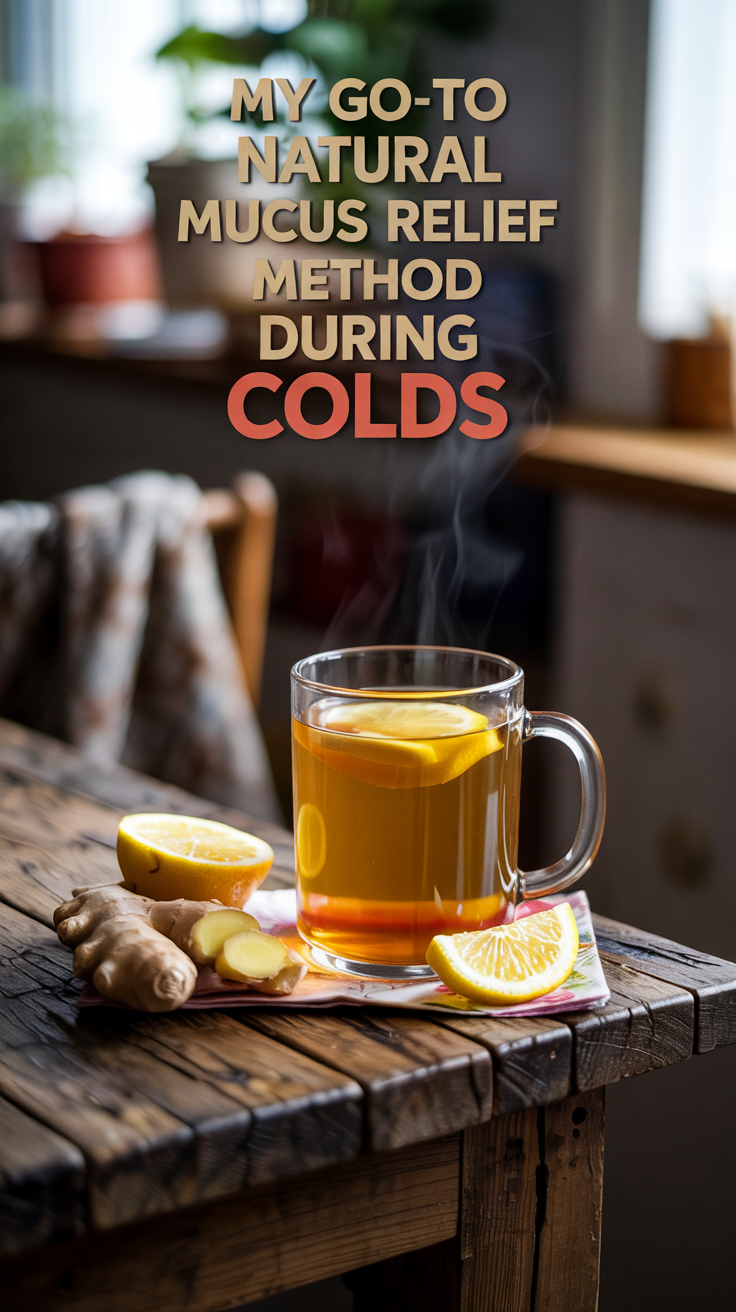My Go-To Natural Mucus Relief Method During Colds
Staying hydrated is your best bet for thinning mucus during colds. Drink warm fluids like ginger tea for added relief and inflammation reduction. Incorporate honey; its natural properties can soothe your throat and fight infections. Also, consider chicken soup for nutrition and garlic for its anti-inflammatory benefits. Keeping your environment humid can prevent dryness and support airway clearance. You’ve just scratched the surface; there’s plenty more to discover to combat mucus effectively!
Hydration: The Key to Thinning Mucus
How important is hydration when it comes to thinning mucus?
Staying well-hydrated is vital for effective mucus relief remedies.
When you drink enough water, you keep your mucus thin and fluid, which helps trap pathogens and clear your airways more efficiently. Proper hydration also prevents mucus from becoming hyperconcentrated, reducing the risk of infection. Remember, hydrated mucus clears 2-3 times faster than dehydrated secretions! Additionally, optimal hydration ensures efficient mucus function as a barrier against irritants. Furthermore, drinking warm fluids like ginger tea can provide added benefits by helping to reduce inflammation in the respiratory system. Plus, maintaining room humidity between 40-60% can help keep your airways from drying out.
Natural Ingredients: Boosting Relief With Honey and Ginger
Honey and ginger aren’t just tasty; they pack a powerful punch when it comes to relieving cold symptoms. With ginger’s anti-inflammatory properties and honey’s soothing effects, you can craft simple remedies that really help. One popular option is the Warm Lemon, Honey, and Ginger Soother, an infusion inspired by various cultural traditions for soothing colds. Research shows significant improvements in cold symptom duration with natural treatments, highlighting the importance of these remedies in your cold relief routine! Let’s explore how these natural ingredients can elevate your cold relief routine!
Health Benefits of Honey
Discovering the health benefits of honey can transform your approach to managing cold symptoms, particularly when paired with ginger. Honey’s antimicrobial properties help fight off viral infections, while its soothing qualities calm a scratchy throat. If you’re struggling with coughs, honey can effectively reduce their severity and frequency, making it a natural alternative to cough syrups. You can mix it with ingredients like cinnamon or lemon for added relief. Regular consumption might even boost your immune system, aiding in quicker recovery during cold season. Honey shows promise for relieving sore throats as a simple, effective remedy for smoother breathing and overall wellness.
Ginger’s Anti-inflammatory Properties
When you’re looking for natural relief during cold season, ginger stands out for its powerful anti-inflammatory properties.
Rich in compounds like gingerols and shogaols, it effectively reduces inflammation by inhibiting the production of pro-inflammatory cytokines. Ginger inhibits COX2 and LOX pathways to prevent inflammation, which means ginger can help soothe your body as you battle that stubborn cold.
Research shows it works comparably to some non-steroidal anti-inflammatory drugs, targeting inflammatory pathways and modulating immune responses.
Easy Honey-Ginger Remedies
A soothing remedy for colds often comes from your kitchen, thanks to the powerful combination of honey and ginger.
These two ingredients work wonders, easing coughs and clearing mucus.
-
Honey soothes irritated throats and fights infections.
-
Ginger warms your body and promotes circulation, helping you feel better. Research suggests that ginger may help prevent colds as well, making it an excellent addition to your wellness routine.
-
Adding lemon boosts Vitamin C, enhancing your immune response.
To prepare, steep grated ginger in hot water, then mix in honey and lemon juice.
This comforting drink can be enjoyed throughout the day, providing relief and warmth as you tackle those pesky cold symptoms!
Warm Environments: The Role of Heat in Easing Congestion
Warm, inviting air can feel like a refuge when you’re battling nasal congestion caused by a cold.
Heat can help create a cozy environment, but be cautious; dry heat can lead to thicker mucus and irritation.
Maintaining balanced humidity is key for optimal mucus flow.
While warmth may not significantly reduce swelling, it helps your cilia function better, clearing out congestion.
Remember to stay hydrated, as proper moisture levels are crucial. Excess mucus can harbor bacteria, leading to infections.
Avoid drastic temperature changes, and consider using a humidifier to keep your nasal passages comfortable, making it easier for you to breathe and feel better.
Nutritional Support: Foods That Help Combat Mucus
Battling mucus doesn’t have to mean suffering in silence; the right foods can make a significant difference in your comfort and recovery.
Incorporating certain nutrient-rich options into your diet can help reduce mucus production and inflammation.
- Chicken soup: A warm hug for your sinuses!
- Garlic: A powerful ally with anti-inflammatory properties.
- Blueberries: Packed with antioxidants to support your health.
Focus on including foods that provide vitamin C, omega-3 fatty acids, and other anti-inflammatory compounds. Regular consumption of zinc lozenges can also aid in fighting off colds and reducing mucus.
Additionally, stay hydrated, and avoid heavy or processed foods that might worsen congestion.
Your body will thank you!
Herbal Remedies: Utilizing Nature’s Expectorants
Herbal remedies can work wonders, tackling mucus and congestion naturally. Here’s a quick breakdown of some effective expectorants:
| Herb | Benefits |
|---|---|
| Lemon and Honey | Reduces inflammation, soothes throat |
| Ginger | Thins mucus, combats nausea |
| Pineapple & Watercress | Liquefies phlegm, boosts immunity |
Try incorporating these herbal remedies into your routine for greater relief. They not only help clear airways but also support your overall immune function! Additionally, combining honey and lemon can enhance soothing effects and provide significant benefits against coughs.
Environmental Adjustments: Creating a Comforting Atmosphere
Creating a comforting atmosphere can significantly improve your well-being when you’re battling a cold.
Simple environmental adjustments can make a huge difference.
Consider these tips:
- Temperature Control: Keep your space warm but not overheated to relieve discomfort.
- Humidity Management: Use a humidifier to prevent dryness in your throat and nasal passages.
- Soft Lighting: Choose warm, dimmable lights to create a cozy space that promotes relaxation. Additionally, maintaining humidity levels can help clear nasal passages and reduce congestion.








